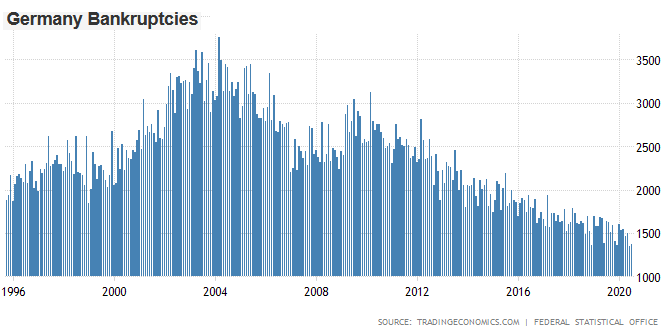Extend-and-Pretend Caused Bankruptcies to Plunge in Germany, France, Spain. Now Central Banks Tell Banks to Prepare for Bankruptcy Surge
The “second wave,” if prolonged, could cause bad loans to almost triple, to €1.4 trillion, says the ECB.
German banks need to prepare themselves for a sharp spike in corporate bankruptcies early next year, the Bundesbank warned this week in its 2020 Financial Stability Review. It anticipates around 6,000 insolvencies in the first quarter of 2021. While this would be a little lower than at the peak quarter of the Global Financial Crisis, the Bundesbank cautioned that it “cannot rule out that … a lot more companies will go bankrupt than is currently expected.”
Although Germany is in the grip of its worst economic contraction since World War 2, fewer insolvencies have been filed this year compared to 2019. This is the result of the weird bailout-and-stimulus economy, and includes these factors:
- Banks’ broad application of forbearance measures, which has given businesses extra financial leeway;
- The roll out of state-backed emergency loans and grants for struggling businesses, large and small, which forms the backbone of the country’s €1.3 trillion (so far) stimulus program;
- Germany’s “Kurzarbeit” social insurance program, which enables employers to reduce their employees’ working hours instead of laying them off, picking up government subsidies in the process.
- And most importantly, the temporary suspension of bankruptcy-declaration requirements.
Helped along by these measures, the number of firms declaring insolvency in Germany fell 6.2% to 9,006 in the first half of this year from the same period last year, trending at their lowest level in 25 years, even as the economy shrinks at its fastest rate in over 70 years.

…click on the above link to read the rest of the article…